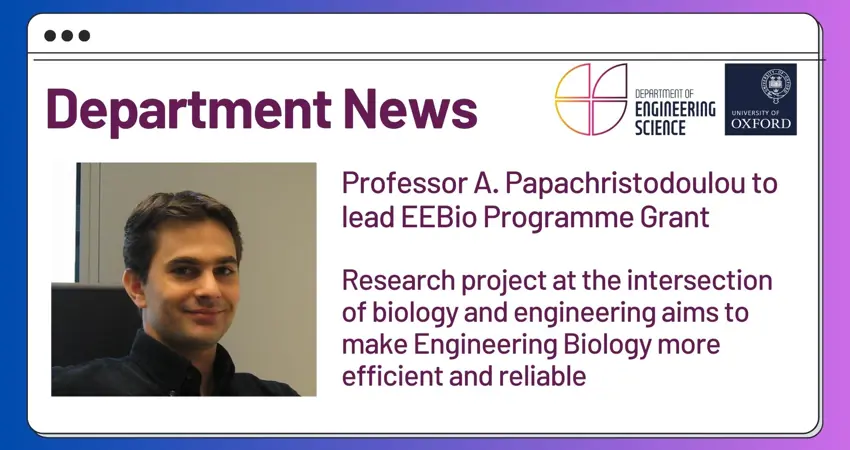01 May 2024
Research project at the intersection of biology and engineering aims to make Engineering Biology more efficient and reliable
Professor A. Papachristodoulou to lead EEBio Programme Grant which aims to empower Engineering Biology with systems and control engineering tools

Research at the intersection of biology and engineering has expanded our understanding of living systems and the many unique and valuable capabilities they possess. Scientists and engineers have now begun to harness this knowledge in new ways to address some of humanity's most pressing challenges.
The new multi-partner and multi-disciplinary Programme Grant, EEBio, represents a timely investment in this new field of Engineering Biology which is set to play a defining role in the future of our society and the rapidly growing Bioeconomy. Led by Principal Investigator Professor Antonis Papachristodoulou, the EPSRC-funded project aims to empower the field of Engineering Biology with systems and control engineering methods and tools so that it becomes more reliable and efficient as it is deployed into applications that promise a healthy, sustainable, and equitable future.
EEBio (Efficient Engineering and Control of Predictable and Reliable Biosystems) brings together leading experts from academia and industry: the University of Oxford is joined by Imperial College London and the University of Bristol, as well as industry partners including Syngulon and Evonetix and multiple other organisations with expertise in the field, including Caltech and ETH Zurich. Within Oxford’s Engineering Science, the team includes Professors Wei Huang and Harrison Steel.
The project’s primary goal is to develop rigorous methods and tools that will enable the engineering of reliable and robust biological systems. Currently, the lack of a well-defined biological engineering process has hindered the scalability and predictability of biosystems when applied in real-world settings. EEBio seeks to bridge this gap by leveraging control engineering principles and artificial intelligence to create what is termed "feedback biocontrollers." These biocontrollers will operate within cells, between cells, and even interact with non-biological entities, allowing researchers and innovators to harness the full potential of engineered biology in various applications.

The feedback biocontrollers developed in the EEBio project have potential impacts in a wide range of applications, including healthcare, agriculture and food production, industrial manufacturing and environmental conservation. In healthcare, for example, feedback biocontrollers can be used to engineer targeted drug delivery systems, personalized medicine approaches, and biosensors for early disease detection. The precise control offered by the biocontrollers could enhance the effectiveness and safety of medical treatments.
The project has been awarded Programme Grant funding of £11m by the Engineering and Physical Sciences Research Council (EPSRC), enabling a comprehensive exploration of the intersection between biology and control engineering over the next five years. This project represents a significant investment in the emerging field of Engineering Biology and showcases Oxford's commitment to pioneering research that addresses global challenges.
Antonis Papachristodoulou joined the University of Oxford in 2006, where he develops tools and algorithms based on modern control theory for the robust analysis and design of biological and technological systems and applies them in a range of areas. He was previously EPSRC Fellow and Director of the EPSRC & BBSRC Centre for Doctoral training in Synthetic Biology and currently co-directs the new EPSRC & BBSRC Centre for Doctoral training in Engineering Biology.
To stay updated on the latest developments and achievements of EEBio, please visit the project's official website. For more information regarding research in Engineering Biology at Oxford, please visit our new website on Engineering Biology at Oxford.
This year’s Lubbock Lecture, our annual Alumni event, is on the theme of “Synthetic Biology: Biology by Design” and includes a talk by Professor Papachristodoulou on Feedback in Engineering Biology: designing Biocontrollers as well as a talk by Professor Harrison Steel on Engineering Robotic Tools for Synthetic Biology.




